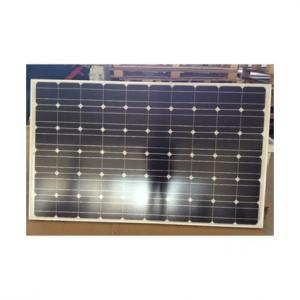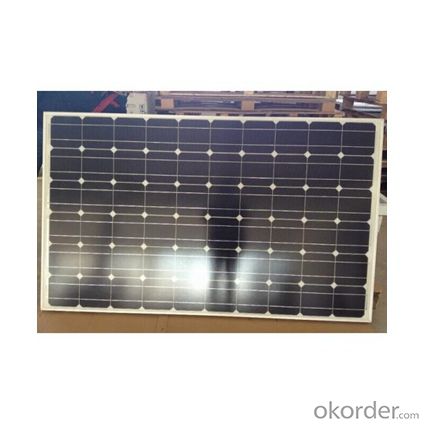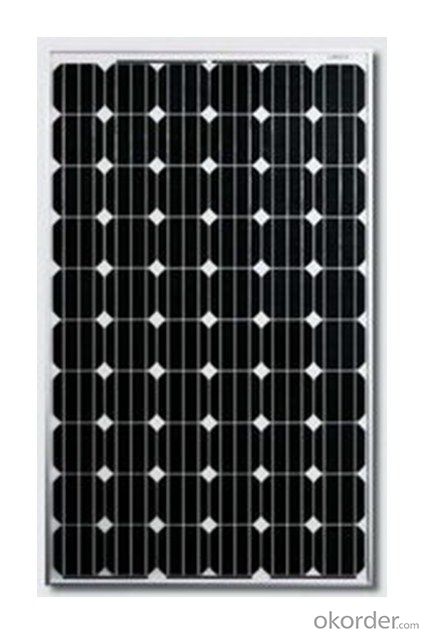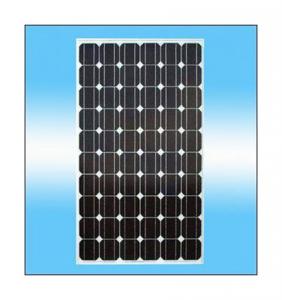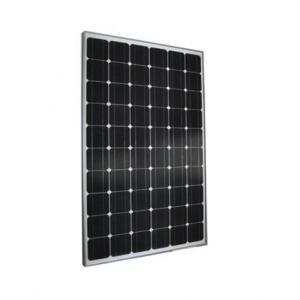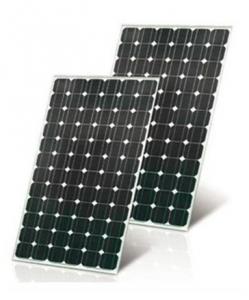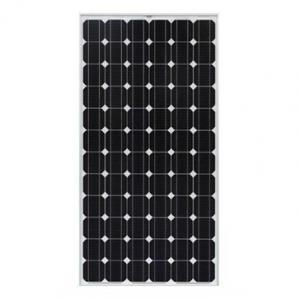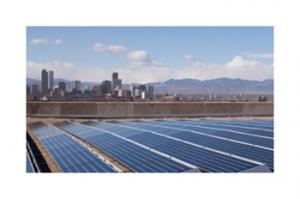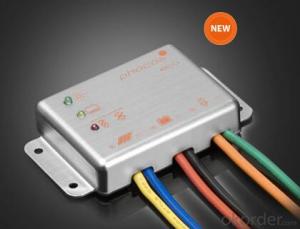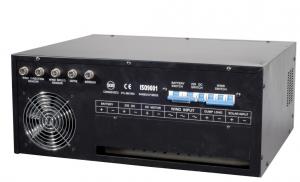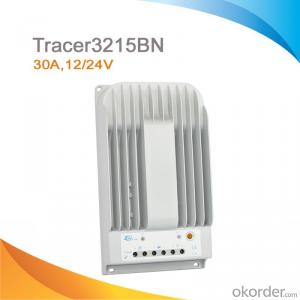Best Solar Energy Controllers - Solar Module Mono-Crystalline 125*125 240W Module
OKorder Service Pledge
OKorder Financial Service
You Might Also Like
A solar panel, or photovoltaic PV module, is a device that is composed of solar cells and which, when struck by photons of light from the sun, generates an electrical current which can then be used to power DC or AC electrical loads.
We are one of the well known manufacturers and suppliers of an extensive range of solar module. Entire range of our products is well checked before offering to the clients to ensure that our products are free from any defect. Our products are delivered within the stipulated time frame. These solar module are available for outdoor applications. Our solar module are designed as per the set industry standards and can be bought at market leading Available with us in various dimensions, these modules are stringently tested under define parameters before the final dispatch by our professional who hold rich industry experience in this domain.
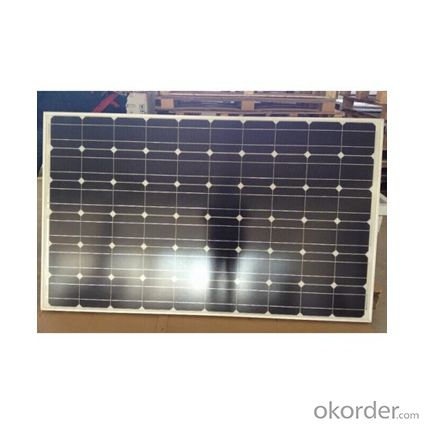
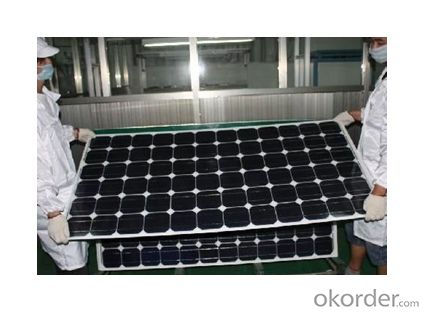
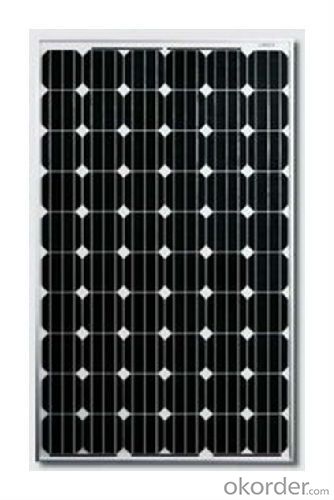
Electrical Characteristics
Max-power (W) | 240 |
Max-Power Voltage (V) | 50.4 |
Max-Power Current (A) | 4.80 |
Open-Circuit Voltage (V) | 60.4 |
Short-Circuit Current (A) | 5.30 |
Mechanical Characteristics
Cable type, Diameter and Length | 4mm2, TUV certified, 1000mm |
Type of Connector | Compatible with MC4 plug |
Arrangement of cells | 6*12 |
Cell Size | 125*125 |
Dimension | 1580*1069*45 |
Weight | 20.5Kg |
Glass, Type and Thickness | High Transmission, Low Iron, Tempered Glass 3.2mm |
Features
Excellent performance under low light environments (mornings evenings and cloudy days)
12 years for product defects in materials and workmanship and 25 years for 80% of warranted minimum power.
Certifications and standards: IEC 61215.
Manufactured according to International Quality and Environment Management System (ISO9001, ISO14100).
FAQ
Q: Do you have any MOQ limit?
Our MOQ is 200 pieces.
Q: How long is the warranty period for the solar modules?
15 years 90% of its nominal power rating.
25 years 80% of its nominal power rating
Q: What kind of loads can I run on PV?
With a correctly designed PV system you can power almost any electrical load. However, as the load size increases the expense also increases. Loads like hot water heaters, air conditioners, room heaters and electric stoves should be avoided. The added cost of trying to power loads like these is very cost prohibitive. If these loads have to be powered it will be a lot less expensive to change the appliance to use an alternative fuel type like propane.
Q: When do I need a charge controller and why?
The safest way to figure out if you need a charge controller is to take Battery Amp Hour Capacity and divide this by the Solar Panel max. power amp rating. If the quotient is above 200, you don't need a controller. If the number is less than 200 than you need a controller.
For example if you have a 100 amp hour battery and a 10 watt panel, you take 100 and divide it by .6 (600mA) and you get 166.6. Since this is less than 200 you need a charge controller. If you have a five-watt panel in the above example you take 100 divided by .3 (300mA) and you come up with 333.3. Since this is larger than 200 you do not need a charge controller. However you still need a blocking diode, to prevent the battery from discharging to the panel at night. So as a general rule of thumb you don't need a charge controller unless you have more than five watts of solar for every 100-amp hours of battery capacity.
Q: What is PV & how does it work?
PV stands for photovoltaic. Photo = Light and Voltaic = Electricity. A solar cell converts light to electricity.
A solar cell is made of silicon. Computer chips are made of this same material. Basically, when light strikes the surface of a solar cell some of it is absorbed into the silicon. This light energy bumps the electrons loose and causes energy to flow.
By packaging approximately 36 solar cells together a solar panel or a solar module is created. When you have more then one solar panels you create a solar array.
- Q: What is the maximum number of solar panels a solar controller can handle?
- The maximum number of solar panels a solar controller can handle depends on the specific model and its specifications. Different solar controllers have different capacity limits, which are typically measured in terms of the maximum input voltage and current they can handle. It is important to consult the manufacturer's specifications or user manual to determine the exact maximum number of solar panels that a specific solar controller can handle.
- Q: Can a solar controller be used with a solar-powered desalination plant?
- Yes, a solar controller can be used with a solar-powered desalination plant. A solar controller is a device that regulates the flow of electricity from the solar panels to the desalination plant's components. It ensures that the panels are operating at their optimal efficiency and that the energy generated is being utilized effectively. By using a solar controller, the desalination plant can effectively harness and convert solar energy into electricity to power the plant's processes, such as pumping water and operating the desalination equipment. This helps to minimize the plant's reliance on external power sources and make it more sustainable and cost-effective.
- Q: Can a solar controller be used with different types of batteries (e.g., lead-acid, lithium-ion)?
- Yes, a solar controller can be used with different types of batteries including lead-acid and lithium-ion. However, it is important to ensure that the solar controller is compatible with the specific type of battery being used in order to optimize charging and prevent damage to the battery.
- Q: Can a solar controller be used with a solar-powered water purification system?
- Yes, a solar controller can be used with a solar-powered water purification system. A solar controller is responsible for regulating the amount of power being generated by solar panels and ensuring that it is optimized for the system's needs. In a solar-powered water purification system, the solar controller would help manage the power supply to the purification components, such as pumps or filters, ensuring efficient operation and maximizing the use of solar energy.
- Q: How do I prevent short-circuiting with a solar controller?
- In order to avoid short-circuiting with a solar controller, there are several essential steps that can be taken: 1. Ensure proper wiring: It is important to securely tighten and insulate all wiring connections. Loose or exposed wires can increase the risk of short-circuiting. Using high-quality cables and connectors that are suitable for the current and voltage of your solar system is recommended. 2. Install fuses or circuit breakers: It is advisable to include appropriate fuses or circuit breakers in the positive and negative connections between the solar panels, controller, and battery bank. These protective devices will automatically disconnect the circuit in the event of a short-circuit, preventing any harm to the controller or other components. 3. Regularly maintain your system: Regularly inspect your solar system for any signs of wear, damage, or loose connections. Cleaning the panels to ensure maximum efficiency and removing any debris that could potentially cause a short-circuit is important. 4. Proper grounding: It is crucial to properly ground your solar system. This involves connecting the negative terminal of the battery bank to a grounding rod. Grounding helps dissipate any stray electrical charges and reduces the risk of short-circuiting. 5. Use a suitable solar controller: Ensure that the solar controller you select is appropriate for your specific solar system configuration and meets its maximum current and voltage requirements. Oversized or undersized controllers can increase the risk of short-circuiting. 6. Follow manufacturer guidelines: Always refer to the manufacturer's instructions and guidelines for your particular solar controller. They often provide specific recommendations and precautions to prevent short-circuiting and ensure the safe operation of your solar system. By following these precautionary measures, the potential for short-circuiting in your solar controller can be significantly reduced, ensuring the efficient and safe functioning of your solar power system.
- Q: Can a solar controller be used with solar battery storage systems?
- Yes, a solar controller can be used with solar battery storage systems. The solar controller regulates the charging and discharging of the batteries, ensuring optimal performance and extending their lifespan. It also helps to protect the batteries from overcharging or discharging, making it an essential component in solar battery storage systems.
- Q: Can a solar controller be used with solar panel bypass diodes?
- Solar panel bypass diodes can indeed be utilized alongside a solar controller. It is customary to incorporate bypass diodes in solar panel setups to counteract power losses caused by shading or partial shading. By offering alternative paths for current to bypass shaded cells, bypass diodes assist in minimizing the impact of shaded cells on the overall performance of the solar panel array. On the other hand, a solar controller's role revolves around regulating the charging and discharging of a battery bank that is connected to the solar panel system. Its purpose is to optimize the charging process and prevent any instances of overcharging or over-discharging of the batteries. Ordinarily, the solar controller is positioned between the solar panels and the battery bank. Since the bypass diodes are integrated within the solar panels themselves, the solar controller does not have direct interaction with them. However, it manages the overall solar panel array and battery bank, ensuring efficient energy transfer and storage. As a result, using a solar controller in conjunction with solar panel bypass diodes is not only feasible but also advised for a properly functioning solar power system.
- Q: Can a solar controller be used with solar-powered indoor hospitality facilities?
- Yes, a solar controller can be used with solar-powered indoor hospitality facilities. A solar controller is used to regulate and optimize the charging and discharging of batteries in a solar power system. It ensures that the batteries are charged efficiently and protected from overcharging or discharging. Therefore, it can be utilized in solar-powered indoor hospitality facilities to manage the power generated by solar panels and provide a stable and reliable source of electricity.
- Q: Can a solar controller be used with a solar-powered satellite navigation system?
- Yes, a solar controller can be used with a solar-powered satellite navigation system. A solar controller, also known as a charge controller, is a device that regulates the flow of electricity from the solar panels to the batteries, ensuring they are charged efficiently and preventing overcharging. In a solar-powered satellite navigation system, solar panels are used to generate electricity from the sun's energy. This electricity is then stored in batteries for use when the sunlight is not available, such as during nighttime or in cloudy weather conditions. A solar controller plays a crucial role in this system by managing the charging process of the batteries. It monitors the voltage and current from the solar panels and adjusts the charging rate to prevent overcharging, which can damage the batteries. Additionally, it helps optimize the charging efficiency by maintaining the batteries at their optimal charge level. By using a solar controller, the solar-powered satellite navigation system can effectively harness the sun's energy and ensure the batteries are properly charged, maximizing the system's performance and longevity.
- Q: Solar controller can not charge what is the reason the electric power will be less than the inverter with no fixed freezer! Solar energy simply did not charge into the electricity
- Overdischarge protection Termination voltage: This is better understood. Battery discharge can not be lower than this value, which is the provisions of the national standard. Although the battery manufacturers have their own protection parameters (standard or line standard), but ultimately to close to the national standard. It should be noted that, for safety reasons, the general 12V battery over the protection point voltage plus 0.3v as a temperature compensation or control circuit zero drift correction, so 12V battery over discharge protection voltage is: 11.10v, then 24V system over discharge protection point voltage is 22.20V. At present, many manufacturers of charge and discharge controller are used 22.2v (24v system) standard.
Send your message to us
Best Solar Energy Controllers - Solar Module Mono-Crystalline 125*125 240W Module
OKorder Service Pledge
OKorder Financial Service
Similar products
Hot products
Hot Searches
Related keywords
